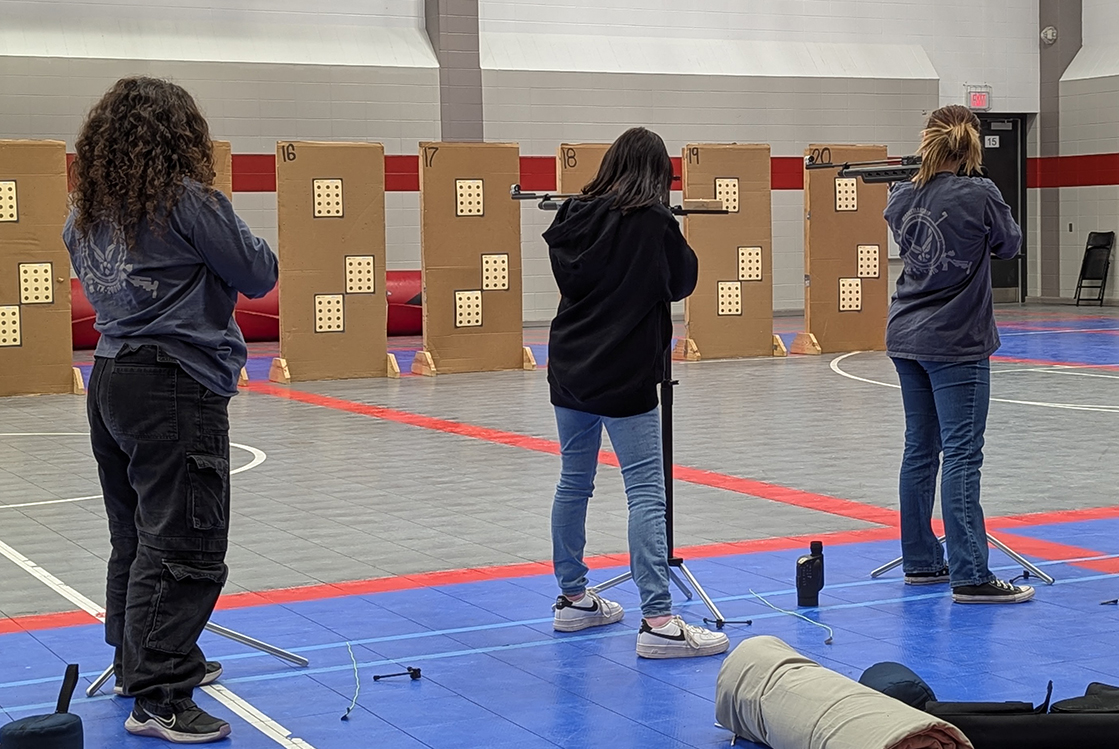Over Spring Break, Bryan ISD learned they would need an option to ensure instruction despite the COVID-19 pandemic causing the world to screech to a standstill.
One of the first things that they wanted to do was get at least one device in every household. They approached the problem by first identifying how many households there are in the district: 8,972. Then they looked at how many Chromebooks they could pull from campuses and determined that 9,068 devices could be used.
They assumed there would be a percentage of families that would not need a device and some that would need multiple, so they felt they could release a survey to parents about technology needs including internet and computer access. By the end of April, over 5,000 Chromebooks were checked out with over 700 more waiting to be distributed.
Accomplishing that distribution was no easy task as teams had to pull, clean, repair, and configure equipment so that it was ready for use in student homes. The networking team also worked on relocating the internet access points so they were pointing outside the district, and added outdoor access points to augment the wireless access at all campuses. The district also worked with Suddenlink to help families get internet access and expanded their help desk personnel to eight staff members to assist with calls.
“The reason the district moved so quickly was to ensure we could get the maximum number of students connected and learning from home,” executive director of technology services Julea Johnson said. “We saw how COVID-19 was spreading so quickly and were worried that if we didn’t move fast we would lose our opportunity to help our students.”
Johnson said that she works with great people who have been willing to work long hours through tough situations to make sure students and families are taken care of because they believe in service to others and the power of education.
“Although continuity of instruction was our main concern, I think another thing the quick response provided was a way to connect to our students, parents, and each other while everyone was sheltering in place,” Johnson said. “I don’t know if we can judge the impact of our response just yet, but I believe that has made us all think about how instruction can happen in many different ways.”
One parent, Emily Mayerhoff, recognizes the difficulties the students and district faced with technology and appreciates everything that has been done to help students transition into this process.
“I love that Bryan ISD has been able to provide computers for our students,” Mayerhoff said. “This lifeline has been valuable to students during this time of at home learning as it continues their education, but it also allows the students to stay connected with friends and teachers. I would love to have an evening parent Google Hangout from time to time to stay connected with my children’s teachers/campus.”
With devices distributed, the district also looked at a way to manage information and help teachers and students stay connected. The main platform the district is using is Schoology, which everything else is funneled through. The district began training teachers on March 31 and April 1, and then teachers rolled out course materials on April 3 with the first set of lessons to be completed by April 6.
Principal Lane Buban helped direct this process no matter what challenge the district came across.
“Given the circumstances, we were able to be up and running with Schoology very quickly,” Buban said. “The district is blessed in that we have sufficient technology to provide for our kids and families who don’t have access. The hard part has been the access to wifi, which is something that the district has little control over. I am proud of our teachers and our students both for adapting to this change like they have. We have over 90% of our students who have logged in to Schoology.”
Superintendent Christie Whitbeck believes that while this new way of learning is not ideal, teachers are doing their best to educate their students.
“I will always believe that a student’s best teacher is their teacher, not a device,” Whitbeck said. “The computer has usually been a support and not in place of the teacher. We purposely did not start out with packets of paper because that is simply practice and not engagement with a professional. I am glad we went this direction as I think, with 95% of the students now on Schoology, we are more interactive with our professional staff and learning will be higher than simply doing paper/pencil assignments.”
Parent Charissa Siegert appreciates the district work to do their best to provide students with an equitable education as she recognizes many districts and families are in different situations.
“One of the negatives about online schooling is that the impact of technology is uneven,” Siegert said. “Some schools and districts will make better use of technology than others, giving some kids a better education. Parents, though, are even more unequal than technology. Take for example, an only child with two college-educated parents, financially secured, with a flexible work schedule and compare that to a single parent with four children and a high-school education. Those children will have to compete for her attention, and even then she is less likely to be able to help with homework and technology, much less the stress she may be going through such as fears of losing her job, providing food, and infection. Helping her 4th grader may seem more of a lower priority. Poor internet may also play a factor and only one laptop in a household of 4 children.”
Whitbeck emphasizes that the district continues to work behind the scenes to prepare for next year and keep learning happening as well as completing school business like hiring, purchasing, and other critical areas of business. With all of this, she also recognizes that students are the most important part of the educational system and wants the district to ensure they are doing whatever they can to meet each student’s needs.
“Our goal is to engage as many students as possible throughout this closure while at the same time communicating expectations clearly,” Whitbeck said. “It is important that our leadership team provides clear direction for each step of the way.”
Sophomore English teacher Stephanie Manry acknowledged the challenges with learning how to use Schoology in the beginning, but said that once she started using it and learned how to make content easily accessible to students, her anxiety eased.
“The thing I miss most about being in the classroom is my students and the one-on-one interaction/teaching/learning that goes on,” Manry said. “I miss being able to actually help my students with the lessons face-to-face. I miss laughing with them and seeing their smiles each day.”
Although in person learning has taken a pause, Manry is thankful for the contact she still has with her students.
“I am grateful that we have the ability to keep learning happening,” Manry said. “I can’t imagine what school life would be like without technology. I guess we’d have to send the students lessons through snail-mail. And then they’d have to snail-mail them back. It would take forever. I am glad that we are able to give the students the opportunity to continue the semester and earn credit for their classes.”
Aquatic science teacher Colleen Holmes appreciates everything the district has done to keep learning happening, but misses the classroom.
“Schoology lacks the human camaraderie that I get from day to day classroom interactions,” Holmes said. “I do have more one-on-one time with students for instruction throughout the day but I know that the challenge of carving out time for school assignments isn’t the first thing on their minds.”
Aside from struggling with making time to do school work, students also have to learn this new program.
“Learning any new program is always a challenge,” Holmes said. “The learning curve associated with anything new in a short period of time is very frustrating but engaging. I look forward to interacting with my students on a different level. I like creating opportunities for them to excel at their own pace.”
This experience has shown perseverance throughout all students and faculty which allows for the continuation of this school year.
“All of my students have done so well with this adjustment,” Manry said. “I am truly impressed by how many have logged in to Schoology and are keeping up with their assignments. Their dedication is impressive.”
Teachers and parents alike have been encouraged by the efforts of many students to continue learning.
“From the very beginning my daughters’ IB teachers jumped in quickly and started live classrooms,” Siegert said. “At that point, we had no idea how long this shutdown would be, and I was impressed by the dedication and drive these IB teachers have for their students.”
Although all college-level testing has been postponed or changed in a drastic way, students and teachers continue to cover material.
“IB doesn’t stop because of COVID-19,” Siegert said. “These kids have worked so hard up to this point. The teachers have done an excellent job keeping the students informed.”
Technology and independent learning have aided in the continued education throughout this pandemic.
“I’ve seen more independent learning become a part of my children’s education, and I’ve also seen some additional technology tools introduced during this period of at home learning,” Mayerhoff said. “Some of our teachers have really stepped up to stay in communication with parents.”
Many students appreciate the lessening of due dates and schedules.
“The best part of being online is that I do not have a strict timeline,” senior Alexia Mejia said. “I can wake up whenever I want and I can either do all the school work I am assigned the day it is published or the day it is due.”
Students also appreciate the information given by the district to keep them up to date.
“The district has been supportive by giving students a lot of updates,” Alexia said. “They ensured that we get to end our year with some type of major event whether it be graduation, prom, or both. I believe they are trying their best in this situation, and I know a lot of the seniors appreciate it.”
While schoology is the streamline learning platform for now, many teachers will continue to take advantage of schoology in the future.
“We started strong with providing activities for students within the first week but Schoology allowed us to push out lessons centrally and gain the ability to monitor more closely,” Whitbeck said. “I believe Schoology will continue to be an important tool in the years ahead. We have a team looking at options for summer school and the start of the year, but we also await guidance from the Commissioner of Education and the Governor as this is often directed from their levels.”
Whitebeck has enjoyed watching the lessons teachers are creating during this time and the way students have been able to respond and interact.
“I love the extra videos many of our schools have produced showing examples of students working online and their finished products,” Whitbeck said. “I’ve also enjoyed the loving messages from teachers and principals including songs, dance offs and fun ways to show the students they care and miss them.”
While this is the only way that education can move forward for now, many are grateful for the opportunities offered.
“This pandemic has been a real eye-opener of how much we take for granted,” Holmes said. “It has reminded me that relationships are more important than things. It has also reminded me that a simple life can be a good life. It’s all in our perspective.”





